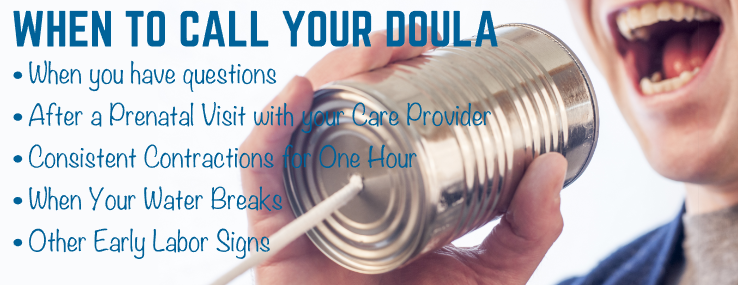You’ve hired a doula to support you throughout your pregnancy and birth—but when should you actually reach out to them?
📌 Should you call if it’s the middle of the night?
📌 What if your doula is with their family?
📌 Is it okay to contact them early in the morning?
✅ Yes! Call your doula. That’s exactly what they’re there for. Being on-call is part of the job, and your doula expects to hear from you whenever support is needed.
To help guide you, here are key moments when you should reach out to your doula:
1. When You Have Questions
One of the greatest benefits of hiring a doula is access to evidence-based, nonjudgmental support throughout your pregnancy.
- Have questions about symptoms, birth plans, or postpartum care? Call, text, or email your doula.
- Need clarity on something your provider said? Your doula can help interpret or suggest follow-up questions.
- Feeling overwhelmed or unsure? Your doula is a calm, reassuring voice when you need it most.
💡 Avoid “Dr. Google”—your doula offers reliable information tailored to your situation.
📖 Reference: Evidence Based Birth, 2023
2. After a Prenatal Visit with Your Care Provider
Keeping your doula informed allows them to offer better, more personalized support.
- Did your provider mention a new condition, test, or change to your birth plan? Let your doula know.
- If your provider recommends hospital admission or expresses a concern, call your doula right away.
- Updates can be shared via text, email, or phone—whatever works for you.
💡 Your doula can help you process new information, manage emotions, and prepare for what comes next.
📖 Reference: American College of Obstetricians and Gynecologists [ACOG], 2023
3. When You Have Consistent Contractions for One Hour
Consistent contractions may be a sign of early labor.
- If you can still talk through contractions, you may be in early labor. Your doula may recommend rest, hydration, or light movement.
- If contractions are regular, more intense, and harder to talk through, you may be entering active labor—it’s time for hands-on support.
💡 Pro tip: Your doula can listen to you during a few contractions over the phone to assess labor progress.
📖 Reference: National Institutes of Health [NIH], 2022
4. When Your Water Breaks
🚨 Call your care provider first, then notify your doula. 🚨
Your provider may ask questions based on the COAT method:
- C – Color (Is it clear, green, or blood-tinged?)
- O – Odor (Does it smell unusual?)
- A – Amount (Is it a gush or a trickle?)
- T – Time (When did it happen?)
Your doula will support you based on your provider’s instructions and labor stage.
📖 Reference: World Health Organization [WHO], 2022
5. When You Experience Other Signs of Early Labor
Labor doesn’t always begin with contractions or water breaking. Call your provider first, then reach out to your doula if you experience:
- Loose stools or nausea (the body’s way of clearing out before labor)
- A “bloody show” or mucus plug
- A strong sense that something is happening or doesn’t feel right
💡 Trust your instincts—your doula can help you interpret signs and determine next steps.
📖 Reference: Mayo Clinic, 2023
Final Thoughts: Don’t Hesitate—Your Doula is Here for You
✔ Doulas are trained professionals who are on-call to support you.
✔ You are never “bothering” them—this is part of their role.
✔ When in doubt, reach out early rather than waiting too long.
A quick call or message can make a world of difference during such a pivotal time.
Have you worked with a doula?
Share your experience in the comments—we’d love to hear how your doula supported you.
Learn More
- DONA International – Find certified doulas
- Evidence Based Birth – Explore doula research and birth resources
References
American College of Obstetricians and Gynecologists. (2023). Patient-provider communication in maternity care. https://www.acog.org
Evidence Based Birth. (2023). The role of doulas in pregnancy & labor. https://www.evidencebasedbirth.com
Mayo Clinic. (2023). Signs of labor & when to go to the hospital. https://www.mayoclinic.org
National Institutes of Health. (2022). Understanding labor progression. https://www.nih.gov
World Health Organization. (2022). Guidelines on spontaneous rupture of membranes. https://www.who.int


[…] When to Call Your Doula […]